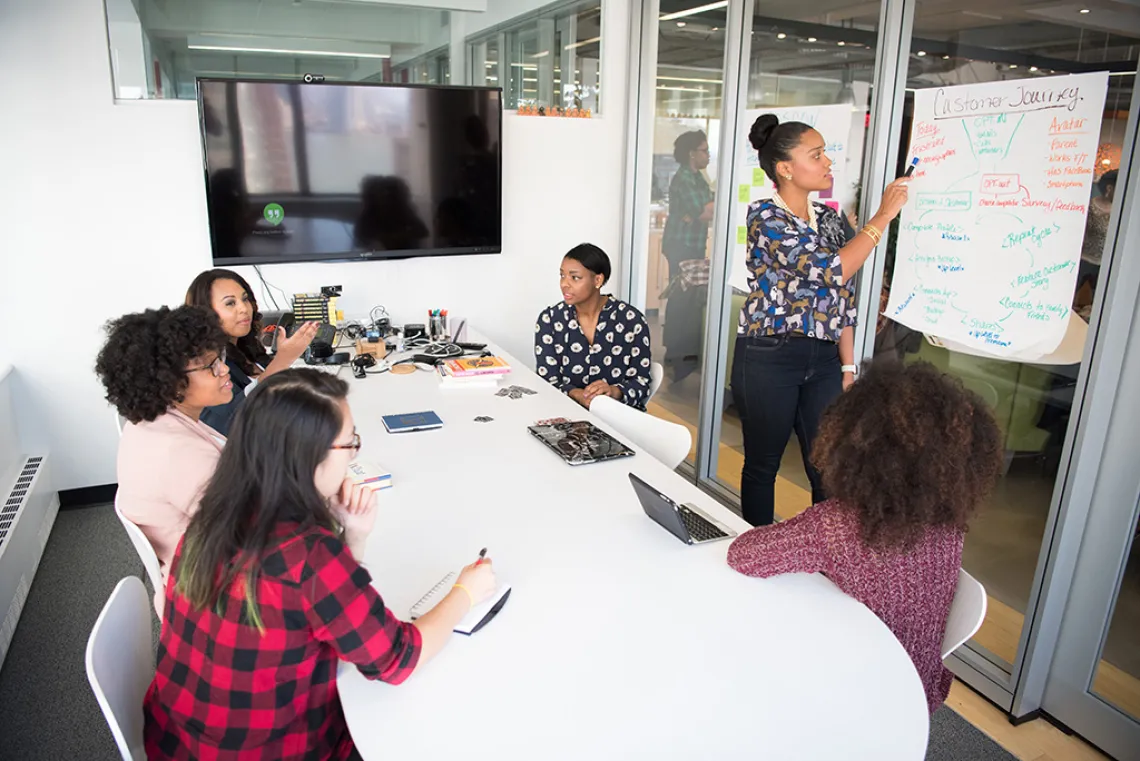Introducing the 21st Century Masters' Project

(Written by Luke Wink-Moran. Photo Credit: Christina Morillo)
Not all students envision graduate school as a pathway to the Ph.D. For some, graduate school is an opportunity to learn and hone skills that they can apply in the workforce directly after earning a master’s degree. These students typically don’t write theses or conduct extensive research. Instead, most opt to create professional projects, portfolios, or other bodies of work that showcase their skills for potential employers. The increasing numbers of “professional master’s” programs reflect the demand for highly skilled experts in the workforce, and the relative scarcity of positions in Ph.D. programs nationwide.
To help students earn professional master’s degrees, the University of Arizona has launched the 21st Century Master’s Project, an initiative led by Dr. Maggie Pitts and her talented team of university faculty and graduate assistants. The initiative is supported by the Office of Strategic Initiatives as part of Pillar 1: The Wildcat Journey.
“The 21st Century Master’s Project seeks to identify and support the curricular and professional development needs of master’s students who are preparing to enter a professional field upon graduation,” explains Dr. Pitts. “As part of the initiative, we are conducting focus groups among graduate stakeholders across the university and across professional fields to learn what the needs are so that we can build structures of support from recruitment through graduation and beyond.”
The project has five objectives. All are led by faculty who have convened taskforces of graduate stakeholders across the University. Each objective is supported by a graduate assistant.
Objective 1 (Led by Dr. Martha P.L. Whitaker, assisted by Shawn Burrage)
- Create and promote accessible, inclusive pathways of entry into workforce master’s programs for diverse audiences.
Objective 2 (Led by Dr. Joel Muraco, assisted by Ana Martinez)
Inspire and support streamlined, yet flexible curricular development and programming that matches the professional needs of graduate students.
Objective 3 (Led by Dr. Michelle McMahon, assisted by Nhung Luong)
Enhance current technology structures to support user-friendly, efficient, and flexible admissions and recruitment processes.
Objective 4 (Led by Dr. Diana Leonard, assisted by Kawther Albader)
Enhance current technology structures to support user-friendly, efficient, and flexible course planning and degree tracking tools for master’s programs.
Objective 5 (Led by Dr. Maggie Pitts, also assisted by Kawther Albader)
Radically revise, simplify, and publicize Graduate College policies and programs supporting professional master’s students.
(In addition, graduate student Alice Fanari assists with many aspects of the project.)
Dr. Martha P.L. Whitaker, leader of objective 1, is reimagining the requirements and curricula of a graduate degree. Two of her most exciting initiatives include having created a pathway for students who may have taken longer-than-normal breaks from their coursework, and the institution of stackable graduate certificates.
Graduate certificates are often comprised of the core classes of an academic department’s master’s program and might appeal to professionals who work in a specialized field but who don’t have formal training within that field. The certificates would allow these professionals to earn an academic certification and develop their expertise without spending two years in school or writing a thesis.
Certificate stacking enables students to create unique educational pathways for themselves. For instance, students interested in water law could earn a graduate certificate in hydrology and a graduate certificate in law to best prepare themselves for their intended field.
Dr. Joel Muraco, who leads objective 2, reflects that, “I’m optimistic we’ll be able to provide graduate students more opportunities to tailor their academic experience and ensure they gain the skills and experiences needed to be competitive when entering the workforce.”
Nhung Luong, a Ph.D. candidate in the College of Education who assists with project management, data collection, and analysis in support of objective 3, is excited that the initiative makes graduate education more accessible and that the project will be backed by data and input from real stakeholders in the community.
Dr. Diana Leonard, who leads objective 4, says that her taskforce is seeking ways to simplify the steps of the current system, removing redundancy, and clarifying the process of degree tracking for current and newly created programs. This might involve rethinking the graduate degree tracking software, GradApp and GradPath, in their relation to professional master’s students who might have different degree tracking milestones than students completing graduate theses.
This is a complex problem because programs differ widely, as do student degree pathways, but Dr. Leonard is confident that changes to the existing system will be of lasting benefit to graduate students.
Although graduate students are at the center of the 21st Century Master’s Project, faculty, local business owners, and members of the Tucson community will also benefit from an increasingly skilled workforce with a curriculum shaped by their input. The project is currently conducting focus group discussions via Zoom, designed for graduate students to provide input on the program’s objectives. Students have the opportunity to participate in conversations about curriculum, application & recruitment, and degree journeys. Degree journey discussions will be held on Nov 19 and Nov 23. (Focus group participants will receive a $10 gift card from either Amazon, Target, Barrio Bread, Scented Leaf Tea House, Starbucks, the University of Arizona Bookstore, or another vendor.)
To contribute your own perspective, please sign up for a focus group or survey and help shape the graduate student experience of tomorrow by lending some of your time today.
For more information, please contact Dr. Maggie Pitts mjpitts@arizona.edu or Kawther Albader, at kawtheralbader@email.arizona.edu).

